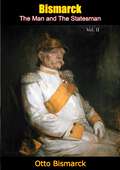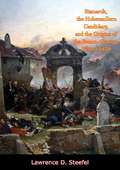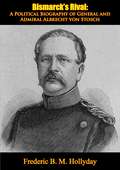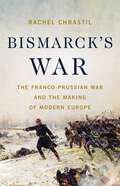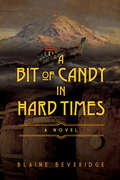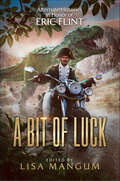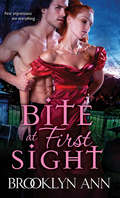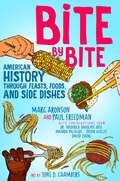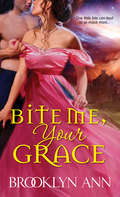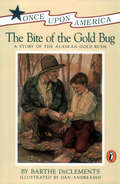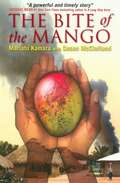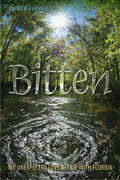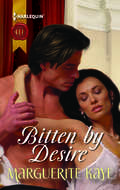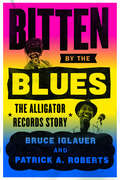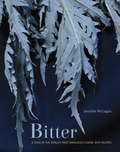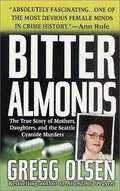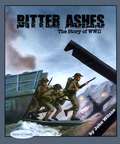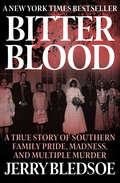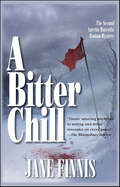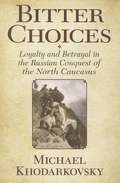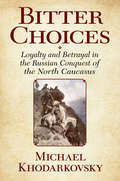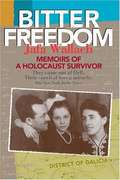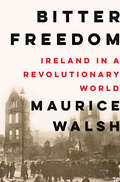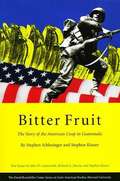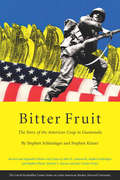- Table View
- List View
Bismarck, The Man and The Statesman Vol. II (Bismarck: The Man and The Statesman #2)
by Otto Bismarck"Politics is the art of the possible," Otto Von Bismarck famously said, and here, in his own words, the art of politics is laid bare by one of the most prominent and influential European statesmen of the nineteenth century. These are the intimate reflections and reminiscences of the man who unified the independent Germanic states into one nation, and whose subsequent promotion of the new country's colonial ambitions earned him the title of the founder of the German empire. This first volume of what must be considered an essential historical document details Bismarck's early life, from the political views of his youth and his entrance into public life through his work in government ministries and his time at the Court of Munich. It is vital reading for any informed, in-depth understanding of modern European history.-Print ed.
Bismarck, the Hohenzollern Candidacy, and the Origins of the Franco-German War of 1870
by Lawrence D. SteefelIt is known that the plan to elect a Prussian prince to the Spanish throne was the proximate, and Bismarck’s “Ems telegram” an immediate cause of the war of 1870. But much has remained obscure about the roles of the principal figures. Lawrence Steefel fills in the lacunae with secret German documents available only after World War II, including the correspondence between Bismarck and Marshal Prim of Spain. It becomes clear that Bismarck did not initiate the Hohenzollern candidacy and that one of his most important reasons for adopting it was his fear of an anti-Prussian coalition of Catholic powers.
Bismarck’s Rival: A Political Biography of General and Admiral Albrecht von Stosch
by Frederic B. M. HollydayOriginally published in 1960, “[t]he political biography of Albrecht von Stosch (1818-1896), a prominent man of action, opens unique insights into the entire Bismarckian epoch. Stosch became a general, an admiral, and a minister of state. As Chief of the Admiralty he was the founder of the Imperial German Navy. He was also a member of the Prussian Chamber of Peers and of the Bundesrat, and he spoke in the Reichstag. His friendship with members of the royal family, the armed forces, the bureaucracy, and his close ties with journalists, members of the Reichstag and Bundesrat, and other leaders of public opinion gave him unusual opportunities to observe the German military and political system at work. His opportunities for observation, combined with a talent for expression and an objective temper of mind, make his published volume of memoirs one of the chief sources of the history of the German Wars of Unification. Paul Matter and Sir Charles G. Robertson, major biographers of Bismarck, regretted that the volume ends with the year 1871. The present study relies in part on the unpublished manuscripts in which Stosch carried the story into the 1890’s. […]“In presenting the political life of Stosch, I have chosen to recount the events of his career and the development of his opinions at some length. It seems to me that truth in modern German history has suffered from the attempts of doctrinaire theorists to cut events and personalities to their own patterns and that what is needed is biographies and monographs which present more elaborate descriptions and more subtle and complex explanations of men and their actions than do books which drive a thesis. Also, it is hoped that to the general historian narrative and descriptive I detail in a specialized account will be more useful than a bare statement.”
Bismarck's War: The Franco-Prussian War and the Making of Modern Europe
by Rachel Chrastil"The best modern account" (Wall Street Journal) of the war that toppled the French Empire, unified Germany, and set Europe on the path to World War I Among the conflicts that convulsed Europe during the nineteenth century, none was more startling and consequential than the Franco-Prussian War of 1870–1871. Deliberately engineered by Prussian chancellor Otto von Bismarck, the war succeeded in shattering French supremacy, deposing Napoleon III, and uniting a new German Empire. But it also produced brutal military innovations and a precarious new imbalance of power that together set the stage for the devastating world wars of the next century. In Bismarck&’s War, historian Rachel Chrastil chronicles events on the battlefield in full, while also showing in intimate detail how the war reshaped and blurred the boundaries between civilian and soldier as the fighting swept across France. The result is the definitive history of a transformative conflict that changed Europe, and the history of warfare, forever.
A Bit of Candy in Hard Times
by Blaine BeveridgeSet in the late 1920s, at the height of prohibition, this is the story of Emmett Dougal, fisherman and rumrunner who, after having his boat shot out from under him by the Coast Guard off the coast of Maine, decides to return to his Puget Sound roots. Emmett’s journey to rediscover a sense of home puts him on a dangerous path when he is forced back into the rum running business. Along the way he finds an unexpected love interest and rekindles his love for the sea. Emmett’s story provides a uniquely Pacific Northwest regional perspective of this infamous chapter in America’s history.
A Bit of Luck: Alternate Histories in Honor of Eric Flint
History may be written by the victors, but it is not always written in stone. Often the difference between a win or a loss comes down to the smallest moment, the smallest shift. A bit of luck. This anthology of twenty alternate history short stories revisits several of those pivotal moments and imagines what might have happened if things had gone just a little bit differently. The authors have drawn upon the whole timeline of history to tell stories of Scottish kings and Russian czars who lived instead of died, of wars whose outcome hinged on one person’s single choice, and of inventions that might have changed the world. The collection is filled with familiar figures—including Billy the Kid, Vlad Dracula, and Jack the Ripper—as well as stories exploring two very different fates of the Roman Empire. The anthology also includes an alternate history from the fictional world of The Great Gatsby. Some stories look at events that have not yet happened, and a few blur the meaning of time itself. History can be surprisingly malleable if we simply look at it in a new light. And, with a bit of luck, the stories that connect the past to the present can lead us into a world we never imagined. A Bit of Luck is the ninth anthology edited by Lisa Mangum and published by WordFire Press. Profits support the Don Hodge Memorial Scholarship fund for the Superstars Writing Seminars.
Bite at First Sight
by Brooklyn AnnHer interest is purely scientific Cassandra Burton wants to study medicine, surgery, healing, and everything related to the human body and its mysteries-and she's willing to rob graves to do it! But a lady can meet dark and dangerous characters lurking around the cemetery. And who could be more fascinating than Rafael Villar, Lord Vampire of London? If she could study his physiology, she could learn so much that would help humans. After all, he's immortal-and Cassandra is now his prisoner. . . Until she gets close enough to touchAs if Rafael didn't have enough to worry about, with a rebellion brewing and his allies out of reach, now he's confronted by a beautiful, fearless lady who wants to heal the scars he's born for centuries. He can't keep her, and he can't let her go, and worst of all, he's every bit as intrigued by her as she is by him.
Bite by Bite: American History through Feasts, Foods, and Side Dishes
by Marc Aronson Paul Freedman Frederick Douglass Opie Amanda Palacios Tatum Willis David ZhengExplore the fascinating history of America as told through the lens of food in this illustrated nonfiction middle grade book that lays out the diverse cultures that have combined to create the rich and delicious tapestry of the American country and cuisine.As American as apple pie. It&’s a familiar saying, yet gumbo and chop suey are also American! What we eat tells us who we are: where we&’re from, how we move from place to place, and how we express our cultures and living traditions. In twelve dishes that take readers from thousands of years ago through today, this book explores the diverse peoples and foodways that make up the United States. From First Salmon Feasts of the Umatilla and Cayuse tribes in the Pacific Northwest to fish fries celebrated by formerly enslaved African Americans, from &“red sauce&” Italian restaurants popular with young bohemians in the East to Cantonese restaurants enjoyed by rebellious young eaters in the West, this is the true story of the many Americas—laid out bite by bite.
Bite Me, Your Grace
by Brooklyn AnnLondon's Lord Vampire Has Problems Dr. John Polidori's tale "The Vampyre" burst upon the Regency scene along with Mary Shelley's Frankenstein after that notorious weekend spent writing ghost stories with Lord Byron. A vampire crazy broke out instantly in the haut ton. Now Ian Ashton, the Lord Vampire of London, has to attend tedious balls, linger in front of mirrors, and eat lots of garlic in an attempt to quell the gossip. If that weren't annoying enough, his neighbor, Angelica Winthrop has literary aspirations of her own and is sneaking into his house at night just to see what she can find. Hungry, tired, and fed up, Ian is in no mood to humor his beautiful intruder...
The Bite of the Gold Bug: A Story of the Alaskan Gold Rush
by Barthe Declements Dan AndreasenIt's 1898, and Bucky can't wait to get to Alaska to find gold and adventure. But the journey is hard. Bucky, Pa, and Uncle Tanner must face deadly storms, numbing cold, and the Golden Stairs--a grueling six-hour nonstop trudge up the mountainside with heavy packs on their backs. Can Bucky make it?<P><P> Bucky and his father, prospecting for gold in Alaska in 1898, must overcome storms, dangerous mountain trails, and wilderness predators before confronting the final challenge of human treachery.
The Bite of the Mango
by Mariatu Kamara Susan McclellandThe astounding story of one girl's journey from war victim to UNICEF Special Representative. As a child in a small rural village in Sierra Leone, Mariatu Kamara lived peacefully surrounded by family and friends. Rumors of rebel attacks were no more than a distant worry. But when 12-year-old Mariatu set out for a neighboring village, she never arrived. Heavily armed rebel soldiers, many no older than children themselves, attacked and tortured Mariatu. During this brutal act of senseless violence they cut off both her hands. Stumbling through the countryside, Mariatu miraculously survived. The sweet taste of a mango, her first food after the attack, reaffirmed her desire to live, but the challenge of clutching the fruit in her bloodied arms reinforced the grim new reality that stood before her. With no parents or living adult to support her and living in a refugee camp, she turned to begging in the streets of Freetown. In this gripping and heartbreaking true story, Mariatu shares with readers the details of the brutal attack, its aftermath and her eventual arrival in Toronto. There she began to pull together the pieces of her broken life with courage, astonishing resilience and hope.
Bitten: My Unexpected Love Affair with Florida
by Andrew FurmanWhen Andrew Furman left the rolling hills of Pennsylvania behind for a new job in Florida, he feared the worst. While he’d heard much of the fabled “southern charm,” he wondered what could possibly be charming about fist-sized mosquitoes, oppressive humidity, and ever-lurking alligators.It wasn’t long before he began to notice that the real Florida right outside his office window was very different from the stereotypes portrayed in movies, television, and even state-promoted tourism advertisements. In Bitten, Furman shares his amazement at the beautiful and the bizarre of his adopted state. Over seventeen years, he and his family have shed their Yankee sensibilities and awakened to the terra incognita of their new home.As he learns to fish for snook—a wily fish that inhabits, among other areas, the concrete-lined canals that crisscross the state—and seeks out the state’s oldest live oak, a behemoth that pre-dates Columbus, Furman realizes that falling in love with Florida is a fun and sometimes humbling process of discovery. Each chapter highlights a fascinating aspect of his journey into the natural environment he once avoided, from snail kites to lizards and cassia to coontie.Sharing his attempts at night fishing, growing native plants, birding, and hiking the Everglades, Furman will inspire you to explore the real Florida. And, if you aren’t lucky enough to reside in the Sunshine State, he’ll at least convince you to unplug for an hour or two and enjoy the natural beauty of wherever it is you call home.
Bitten by Desire
by Marguerite KayeIf you love sexy vampires and sizzling historical romances, then you won't want to miss this chance to re-read this scorching novella by Marguerite Kaye! On a moonlit night, Imogen, Dowager Duchess of Strathfyne, wishes for "something" to end her loneliness. She has no idea that her wish would summon Vaelen, a striking, otherworldly stranger whose sensual touch brings her more pleasure than she has ever known. In the morning, Imogen is sure the erotic encounter was simply a dream--until she starts seeing Vaelen everywhere she goes… . Originally published in 2010.
Bitten by the Blues: The Alligator Records Story (Chicago Visions and Revisions)
by Bruce Iglauer Patrick A. RobertsIt started with the searing sound of a slide careening up the neck of an electric guitar. In 1970, twenty-three-year-old Bruce Iglauer walked into Florence’s Lounge, in the heart of Chicago’s South Side, and was overwhelmed by the joyous, raw Chicago blues of Hound Dog Taylor and the HouseRockers. A year later, Iglauer produced Hound Dog’s debut album in eight hours and pressed a thousand copies, the most he could afford. From that one album grew Alligator Records, the largest independent blues record label in the world. Bitten by the Blues is Iglauer’s memoir of a life immersed in the blues—and the business of the blues. No one person was present at the creation of more great contemporary blues music than Iglauer: he produced albums by Koko Taylor, Albert Collins, Professor Longhair, Johnny Winter, Lonnie Mack, Son Seals, Roy Buchanan, Shemekia Copeland, and many other major figures. In this book, Iglauer takes us behind the scenes, offering unforgettable stories of those charismatic musicians and classic sessions, delivering an intimate and unvarnished look at what it’s like to work with the greats of the blues. It’s a vivid portrait of some of the extraordinary musicians and larger-than-life personalities who brought America’s music to life in the clubs of Chicago’s South and West Sides. Bitten by the Blues is also an expansive history of half a century of blues in Chicago and around the world, tracing the blues recording business through massive transitions, as a genre of music originally created by and for black southerners adapted to an influx of white fans and musicians and found a worldwide audience. Most of the smoky bars and packed clubs that fostered the Chicago blues scene have long since disappeared. But their soul lives on, and so does their sound. As real and audacious as the music that shaped it, Bitten by the Blues is a raucous journey through the world of Genuine Houserockin’ Music.
Bitter
by Jennifer MclaganThe champion of uncelebrated foods including fat, offal, and bones, Jennifer McLagan turns her attention to a fascinating, underappreciated, and trending topic: bitterness. What do coffee, IPA beer, dark chocolate, and radicchio all have in common? They're bitter. While some culinary cultures, such as in Italy and parts of Asia, have an inherent appreciation for bitter flavors (think Campari and Chinese bitter melon), little attention has been given to bitterness in North America: we're much more likely to reach for salty or sweet. However, with a surge in the popularity of craft beers; dark chocolate; coffee; greens like arugula, dandelion, radicchio, and frisée; high-quality olive oil; and cocktails made with Campari and absinthe--all foods and drinks with elements of bitterness--bitter is finally getting its due. In this deep and fascinating exploration of bitter through science, culture, history, and 100 deliciously idiosyncratic recipes--like Cardoon Beef Tagine, White Asparagus with Blood Orange Sauce, and Campari Granita--award-winning author Jennifer McLagan makes a case for this misunderstood flavor and explains how adding a touch of bitter to a dish creates an exciting taste dimension that will bring your cooking to life. From the Hardcover edition.
Bitter Almonds: The True Story of Mothers, Daughters, and the Seattle Cyanide Murders
by Gregg OlsenIn an attempt to cover her tracks, Stella did the unconscionable. She saw to it that a stranger would also become a "random casualty" of cyanide-tainted painkillers. But Stella's cunning plan came undone when her daughter Cynthia notified federal agents. And troubling questions lingered like the secret of bitter almonds...
Bitter Ashes: The Story of WW II
by John WilsonWorld War Two was the greatest conflict in human history. It gave birth to the Atomic Age, the Cold War and the economic boom of the 1950s and 60s, and planted the seeds of today’s Middle East crises. But it is not distant history. Most Canadians have relatives who were part of this world-wide tragedy. Bitter Ashes puts these events in context for them. This book in the illustrated historical series Stories of Canada is a companion to Desperate Glory: The Story of WWI. A clear and concise text leads the reader though the major military and political events and issues of the war. Sidebars add detail and a personal element. Every page is illustrated with either photographs or maps.
Bitter Blood: A True Story of Southern Family Pride, Madness, and Multiple Murder
by Jerry BledsoeThe “riveting” #1 New York Times bestseller: A true story of three wealthy families and the unbreakable ties of blood (Kirkus Reviews). The first bodies found were those of a feisty millionaire widow and her daughter in their posh Louisville, Kentucky, home. Months later, another wealthy widow and her prominent son and daughter-in-law were found savagely slain in Winston-Salem, North Carolina. Mystified police first suspected a professional in the bizarre gangland-style killings that shattered the quiet tranquility of two well-to-do southern communities. But soon a suspicion grew that turned their focus to family. The Sharps. The Newsoms. The Lynches. The only link between the three families was a beautiful, aristocratic young mother named Susie Sharp Newsom Lynch. Could this former child “princess” and fraternity sweetheart have committed such barbarous crimes? And what about her gun-loving first cousin and lover, Fritz Klenner, son of a nationally renowned doctor? In this tale of three families connected by marriage and murder, of obsessive love and bitter custody battles, Jerry Bledsoe recounts the shocking events that ultimately took nine lives, building to a truly horrifying climax that will leave you stunned. “Recreates . . . one of the most shocking crimes of recent years.” —Publishers Weekly “Absorbing suspense.” —Chicago Tribune “Astonishing . . . Brilliantly chronicled.” —Detroit Free Press “An engrossing southern gothic sure to delight fans of the true-crime genre. Bledsoe maintains the suspense with a sure hand.” —The Charlotte Observer
A Bitter Chill: An Aurelia Marcella Roman Mystery (Aurelia Marcella Roman Series #2)
by Jane FinnisIn late December 95 AD, Roman settlers in Britannia are preparing to celebrate Saturnalia. Innkeeper Aurelia Marcella's plans for a peaceful holiday are shattered when her brother brings bad news. An enemy in Rome is trying to destroy her family by spreading rumors that they are plotting against Caesar. Her brother has lost his job as a government investigator, the mansio is menaced by a gang of native criminals, and when a party of rich, demanding travelers arrive to stay, their quarrels and violence spill over into Aurelia's household. Then the Saturnalia banquet, highlight of the festival, culminates in tragic death. The second installment in the Aurelia Marcella series.
Bitter Choices: Loyalty And Betrayal In The Russian Conquest Of The North Caucasus
by Michael KhodarkovskyRussia's attempt to consolidate its authority in the North Caucasus has exerted a terrible price on both sides since the mid-nineteenth century. Michael Khodarkovsky's book tells the story of a single man with multiple allegiances and provides a concise and compelling history of the mountainous region between the Black and Caspian seas. After forays beginning in the late 1500s, Russia tenuously conquered the peoples of the region in the 1850s; the campaign was defined by a cruelty on both sides that established a pattern repeated in our own time, particularly in Chechnya. At the center of Khodarkovsky's sweeping account is Semen Atarshchikov (1807-1845). His father was a Chechen translator in the Russian army, and Atarshchikov grew up with roots in both Russian and Chechen cultures. His facility with local languages earned him quick promotion in the Russian army. Atarshchikov enjoyed the confidence of his superiors, yet he saw the violence that the Russians inflicted on the native population and was torn between his duties as a Russian officer and his affinity with the highlanders. Twice he deserted the army to join the highlanders in raids against his former colleagues. In the end he was betrayed by a compatriot who sought to gain favor with the Russians by killing the infamous Atarshchikov. Khodarkovsky places Atarshchikov's life in a rich context: we learn a great deal about the region's geography, its peoples, their history, and their conflicts with both the Russians and one another. Khodarkovsky reveals disputes among the Russian commanders and the policies they advocated; some argued for humane approaches but always lost out to those who preferred more violent means. Like Hadji Murat--the hero of Tolstoy's last great work--Atarshchikov moved back and forth between Russian and local allegiances; his biography is the story of the North Caucasus, one as relevant today as in the nineteenth century.
Bitter Choices: Loyalty and Betrayal in the Russian Conquest of the North Caucasus
by Michael KhodarkovskyRussia’s attempt to consolidate its authority in the North Caucasus has exerted a terrible price on both sides since the mid-nineteenth century. Michael Khodarkovsky tells a concise and compelling history of the mountainous region between the Black and Caspian seas during the centuries of Russia’s long conquest (1500–1850s). The history of the region unfolds against the background of one man’s life story, Semën Atarshchikov (1807–1845). Torn between his Chechen identity and his duties as a lieutenant and translator in the Russian army, Atarshchikov defected, not once but twice, to join the mountaineers against the invading Russian troops. His was the experience more typical of Russia’s empire-building in the borderlands than the better known stories of the audacious kidnappers and valiant battles. It is a history of the North Caucasus as seen from both sides of the conflict, which continues to make this region Russia’s most violent and vulnerable frontier.
Bitter Freedom: Memoirs of a Holocaust Survivor
by Jafa WallachA riveting account of a unique survival in an earthen hole dug under a cellar floor next to the Gestapo Headquarters of a small Polish town. And the story of a heroic Pole who risked his life and the lives of his family to save the hunted ones.
Bitter Freedom: Ireland in a Revolutionary World
by Maurice Walsh"Sets Ireland's post-1916 history in its global and human context, to brilliant effect." --Neil Hegarty, Irish Times Books of the Year 2015 The Irish Revolution has long been mythologized in American culture but seldom understood. Too often, the story of Irish independence and its grinding aftermath in the early part of the twentieth century has been told only within a parochial Anglo-Irish context. Now, in the critically acclaimed Bitter Freedom, Maurice Walsh, with "a novelist's eye for detailing lives in extremis" (Feargal Keane, Prospect), places revolutionary Ireland within the panorama of nationalist movements born out of World War I. Beginning with the Easter Rising of 1916, Bitter Freedom follows through from the War of Independence to the end of the post-partition civil war in 1924. Walsh renders a history of insurrection, treaty, partition, and civil war in a way that is both compelling and original. Breaking out this history from reductionist, uplifting narratives shrouded in misguided sentiment and romantic falsification, the author provides a gritty, blow-by-blow account of the conflict, from ambushes of soldiers and the swaggering brutality of the Black and Tan militias to city streets raked by sniper fire, police assassinations, and their terrible reprisals; Bitter Freedom provides a kaleidoscopic portrait of the human face of the conflict. Walsh also weaves surprising threads into the story of Irish independence such as jazz, American movies, and psychoanalysis, examining the broader cultural environment of emerging modernity in the early twentieth century, and he shows how Irish nationalism was shaped by a world brimming with revolutionary potential defined by the twin poles of Woodrow Wilson in America and Vladimir Lenin in Russia. In this "invigorating account" (Spectator), Walsh demonstrates how this national revolution, which captured worldwide attention from India to Argentina, was itself profoundly shaped by international events. Bitter Freedom is "the most vivid and dramatic account of this epoch to date" (Literary Review).
Bitter Fruit: The Story of the American Coup in Guatemala
by Stephen Schlesinger Stephen KinzerBitter Fruit recounts in telling detail the CIA operation to overthrow the democratically elected government of Jacobo Arbenz of Guatemala in 1954.
Bitter Fruit: The Story Of The American Coup In Guatemala (Series On Latin American Studies #4)
by Stephen Schlesinger & Stephen KinzerBitter Fruit is a comprehensive and insightful account of the CIA operation to overthrow the democratically elected government of Jacobo Arbenz of Guatemala in 1954. First published in 1982, this book has become a classic, a textbook case of the relationship between the United States and the Third World. The authors make extensive use of U.S. government documents and interviews with former CIA and other officials. It is a warning of what happens when the United States abuses its power.
